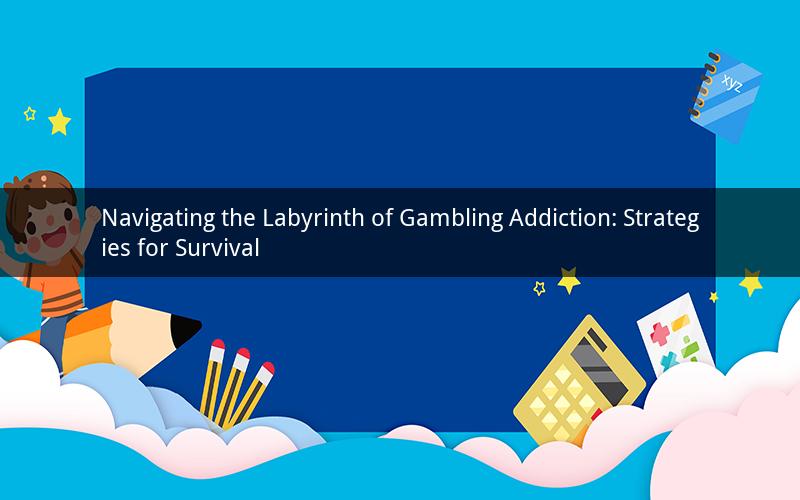
Introduction:
Gambling addiction, a form of impulse control disorder, is a complex issue that affects millions of people worldwide. The allure of the thrill and the potential for winning big can lead individuals into a dangerous spiral of dependency. However, with the right strategies and support, it is possible to survive and overcome gambling addiction. This article explores various approaches to help individuals struggling with this addiction find a path to recovery.
1. Understanding the Basics of Gambling Addiction:
To effectively address gambling addiction, it is crucial to understand its nature and underlying causes. Here are some key points to consider:
What is gambling addiction?
Gambling addiction, also known as problem gambling or compulsive gambling, is characterized by an inability to control or stop gambling, despite negative consequences. It is a chronic condition that can lead to significant personal, financial, and social problems.
Common signs and symptoms:
- Spending more time and money on gambling than intended
- Feeling restless or irritable when attempting to cut down or stop gambling
- Returning to gambling to relieve unpleasant feelings
- Lying to family, friends, or therapists about gambling activities
- Risking or losing significant relationships, jobs, or opportunities due to gambling
Causes of gambling addiction:
- Genetic predisposition
- Environmental factors, such as exposure to gambling at an early age
- Psychological factors, such as seeking excitement, relief from stress, or dealing with emotional issues through gambling
2. Strategies for Surviving Gambling Addiction:
a. Seek Professional Help:
Professional help is a crucial step in overcoming gambling addiction. Therapists, counselors, and support groups can provide personalized guidance and support. Here are some options to consider:
- Cognitive-behavioral therapy (CBT): CBT focuses on identifying and changing negative thought patterns and behaviors associated with gambling addiction.
- Family therapy: Family therapy can help rebuild relationships and improve communication between the individual with gambling addiction and their loved ones.
- Support groups: Joining a support group, such as Gamblers Anonymous, can provide a sense of community and shared experiences.
b. Develop a Support System:
Building a strong support system is essential for survival and recovery from gambling addiction. Here are some ways to foster a supportive environment:
- Reach out to friends and family: Share your struggles and seek their understanding and support.
- Create a support network: Connect with others who have experienced gambling addiction and can offer encouragement and advice.
- Establish boundaries: Set clear boundaries with gambling-related activities and people to minimize triggers and诱惑.
c. Develop Coping Mechanisms:
Finding healthier ways to cope with stress, boredom, and other triggers can help reduce the urge to gamble. Consider the following strategies:
- Engage in hobbies and activities: Participate in activities that provide enjoyment and fulfillment, such as sports, art, or music.
- Practice mindfulness and relaxation techniques: Mindfulness, meditation, and deep-breathing exercises can help manage stress and anxiety.
- Set goals and rewards: Establish personal goals and reward yourself for achieving them, instead of relying on gambling as a source of motivation.
d. Create a Financial Plan:
Gambling addiction often leads to significant financial problems. To survive and recover, it is essential to create a financial plan that addresses these issues:
- Assess your financial situation: Take an honest look at your debts, income, and expenses to understand the extent of your financial problems.
- Develop a budget: Create a realistic budget that prioritizes essential expenses and pays off debts over time.
- Seek financial counseling: Work with a financial counselor to develop a plan to manage and reduce debt.
3. Questions and Answers:
Question 1: How long does it take to recover from gambling addiction?
Answer: Recovery from gambling addiction is a lifelong process. While some individuals may experience immediate improvement, others may require ongoing support and therapy for years.
Question 2: Can I overcome gambling addiction on my own?
Answer: While some individuals may find success in overcoming gambling addiction independently, seeking professional help and joining support groups can significantly improve your chances of long-term recovery.
Question 3: Are there medications available to treat gambling addiction?
Answer: Currently, there are no FDA-approved medications specifically for treating gambling addiction. However, some individuals may benefit from medications used to treat co-occurring disorders, such as depression or anxiety.
Question 4: Can my family and friends recover from the effects of my gambling addiction?
Answer: Yes, family and friends can recover from the effects of gambling addiction. Support groups, counseling, and therapy can help them process their emotions and rebuild their lives.
Question 5: Is it possible to relapse after overcoming gambling addiction?
Answer: Yes, relapse is possible for individuals with gambling addiction. However, with the right strategies and support, relapse can be minimized, and recovery can be reestablished.
Conclusion:
Surviving gambling addiction requires a combination of self-awareness, determination, and support. By understanding the basics of gambling addiction, implementing effective strategies, and seeking professional help, individuals can overcome this challenging condition and lead a fulfilling life. Remember, recovery is a journey, and it is essential to stay committed to the process for long-term success.